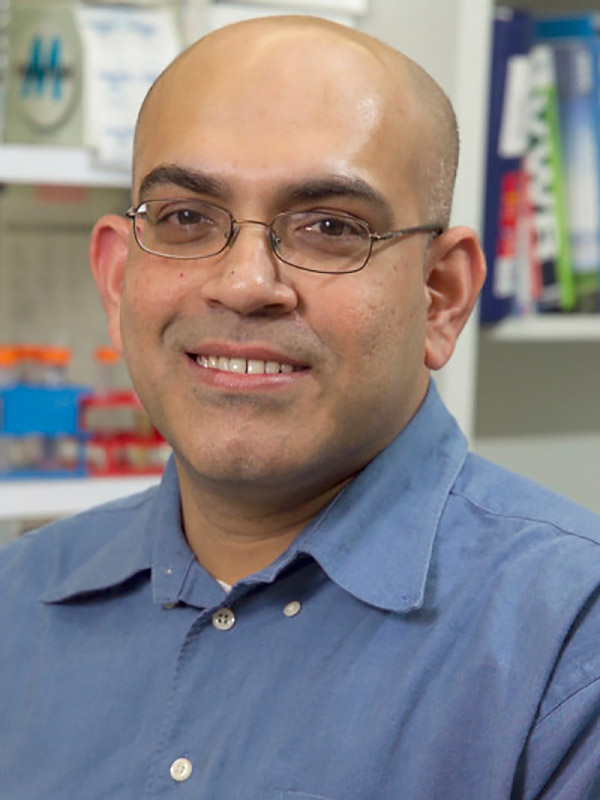
“His clarity of thought, grasp of the literature, and creativity in experimental design signaled to me that this was someone to keep an eye on,” wrote Stewart Shuman, M.D., Ph.D. ’83, in his letter nominating Jayanta Chaudhuri, Ph.D. ’97, for Einstein’s Distinguished Ph.D. Alum Award. Dr. Shuman, who was on Dr. Chaudhuri’s thesis committee, was right.
Dr. Chaudhuri was a graduate student at Einstein in the lab of Umadas Maitra, Ph.D., and later completed his postdoctoral studies at Harvard Medical School. He then joined Memorial Sloan Kettering as an assistant member in the immunology program, and later the Cornell University Graduate School of Medical Sciences as an assistant professor.
Dr. Chaudhuri has spent his career investigating B cells, which produce antibodies that support immunity against pathogens, including viruses and bacteria, and his lab uncovered numerous molecules and pathways responsible for generating and maintaining B cells during an immune response. Dr. Chaudhuri remains with Sloan Kettering and Cornell today as a tenured professor.
Dr. Chaudhuri, why did you decide to pursue research and get your Ph.D.?
Dr. Chaudhuri: “As an undergraduate at Calcutta University, I knew I wanted to be a scientist and needed to come to the U.S. for a well-rounded education. Einstein was well known to us in India as a top medical school, and I heard about a Calcutta University alum, Professor Umadas Maitra, who was doing the coolest science there. I wrote to him, and he offered me a position in his lab.”
What mentors at Einstein helped you in your career?
“Of course Professor Maitra. He had the amazing ability to train budding scientists. He not only taught me how to design experiments but how to think critically and overcome hurdles. Other professors were not direct mentors but made Einstein a fantastic scientific environment. Richard Stanley, the chair of developmental and molecular biology, came to all our work-in-progress talks. I did poorly in one of Barbara Birshtein’s immunology courses, and she made me attend her lab meetings!”
How did your experience at Einstein influence your career?
“Einstein was the most intellectually stimulating place. The students were close knit and scientifically engaged. The department of developmental and molecular biology—then called the department of developmental biology and cancer—had an interactive group of students and faculty. We would meet and discuss our projects, and Yankees vs. Mets, in the gym, or in the small lunchroom on the fifth floor of the Chanin building. My love for the experimental sciences took a firm foothold at Einstein. And I received fantastic training in the Maitra lab. I learned to design biochemical assays and purify proteins. What I did after leaving Einstein could not have been done without My Einstein (formerly Luminis) training.”
What is the professional accomplishment you’re most proud of?
“Proudest moments come when graduate students in my lab decide to ignore my advice and pursue projects that are completely outside the comfort zone of the lab. Nothing gives me greater joy than when a student comes into my office and tells me that my ideas are stale and that they’ve discovered something going against my advice.”
What advice would you give our current and future students at Einstein?
“First, persevere. The hypothesis of your project might be incorrect; 80 to 90 percent of experiments do not work; and the experiment you think will nail everything may be a technical quagmire. Don’t give up! Second, choose wisely. Graduate school is when you learn how to do science. From scratch. You come up with an idea, design experiments to test the idea, trouble-shoot technical issues, and interpret data. All Einstein professors are fantastic mentors, but you need to find the sweet spot where you can develop your own projects and ideas. Third, keep an open mind. You never know what you’ll end up working on. I worked on protein synthesis as a graduate student and ended up an immunologist.”
In recognition of his expertise, Dr. Chaudhuri became a prestigious Damon Runyon Scholar and later a study-section chair for the National Institutes of Health. For his teaching and mentoring of the next generation of scientists, Weill Cornell recognized him for outstanding leadership and commitment.
2024 Alumni Awardees